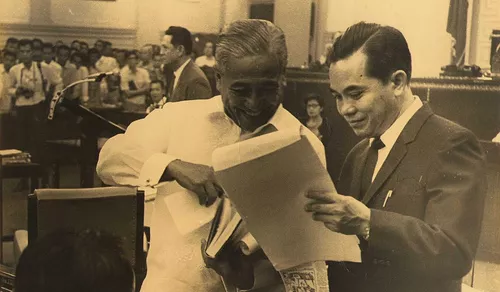On June 22, 1920, Jovito Salonga, a lawyer and legal scholar, educator and a distinguesed senator, was born in poverty in the present day Pasig City to a Presbyterian pastor, Esteban Salonga and Bernardita Reyes a market vendor. Jovito Salonga, the youngest of five brothers, worked his way through college and law school as a proofreader in the publishing firm of his eldest brother, Isayas.

Salonga's long life began after the onset of American rule in the Philippines. His youth was a time of national hope and longing for independence. These things shaped him, alongside his family's deep Christian convictions and the hardships of their daily life. When he was twelve, a speech by the then House Speaker Manuel Roxas in his hometown stirred him to dream of a life in law and in public life.
Seizing on this ambition, he rose through public schools to the College of Law at the University of the Philippines. When war overtook his studies, Salonga quickly ran afoul of the new Japanese authorities. He was tortured and jailed and released after nearly a year. Amid dearth and uncertainty, he crammed for the bar examinations and, in 1944, earned the highest score.
At war's end, Salonga embraced Philippine independence but denounced "parity rights" and other compromising ties to the United States. He topped off his legal education with graduate degrees from Harvard and Yale universities and then plunged headlong into the life of his new nation.
Salonga established himself as a sought-after lawyer and an influential legal scholar and educator. In 1961, the Liberal Party tapped him for a successful run for Congress in his home province of Rizal. Four years later, he outpolled all other candidates for the Senate, a feat he repeated twice. He built his reputation as a crusader for clean government and public education. As a staunch nationalist, he opposed Philippine complicity in the Vietnam War and other acts of "puppetry." And he so persistently exposed the troubling anomalies of President Ferdinand Marcos that the Philippines Free Press named him the "Nation's Fiscalizer."
The bomb that crippled him at a political rally in 1971, Salonga says, led him to a second, "borrowed life". He opposed martial law from the start, defending opponents of the Marcos dictatorship and working tirelessly for the succor and release of political prisoners and for the democratic opposition. In 1980, he himself was jailed without charges and then released. Four years in exile followed.
Yet Salonga never lost hope. In 1985, he returned home to revitalize his political party and confront the dictatorship. Putting aside personal ambition, he withdrew his candidacy for vice president in the snap elections of February 1986 and threw himself heart-and-soul into Corazon Aquino's presidential campaign and the People Power Revolution.
Afterwards, Salonga initiated the new government's legal efforts to reclaim wealth allegedly stolen by the Marcoses as chairman of the Presidential Commission on Good Government. In 1987, voters returned him to the Senate. There, he authored new laws protecting the state from plunder, military coups, and corrupt officials and, in 1991 as Senate president, triumphantly led his colleagues in ejecting American military bases from the Philippines.
Salonga returned to private life the following year, having made a hotly contested but disappointing bid for the presidency. But through his NGOs, Bantay Katarungan (Sentinel of Justice) and Kilos Bayan (People's Action), he has sustained his principled interventions in the affairs of the nation.
Jovito Salonga was awarded the 2007 Ramon Magsaysay Award for Government Service for his exemplary integrity and substance of his long public career in service to democracy and good government in the Philippines.
Senator Salonga died on Thursday, March 10, 2016. He was 95 years old.
References
- Ramon Magsaysay Award Foundation
- Wikipedia

No comments:
Post a Comment